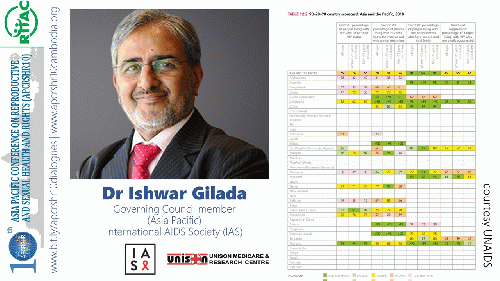
Dr Ishwar Gilada is among the 1st doctors who began HIV care in India when first case got diagnosed
(Image by CNS (Citizen News Service citizen-news.org)) Details DMCA
With nine months left to meet the HIV-related 2020 targets, we are not on track to end AIDS by 2030. In Asia-Pacific region, despite unprecedented progress initially in scaling-up HIV programmes for prevention, treatment, care and support (in different countries and key populations), we are still lagging way behind. The UNAIDS (Joint United Nations programme on HIV/AIDS) report succinctly observes "Asia and the Pacific boasts some of the earliest successes in responding to the HIV epidemic. The region's response, however, is highly uneven, and several national HIV programmes are not keeping pace with their growing HIV epidemics. Creeping complacency in other countries risks squandering gains made thus far.
"Annual new HIV infections are rising rapidly in Bangladesh, Pakistan and the Philippines. Improved access to HIV treatment has reduced the annual number of AIDS-related deaths by 24% since 2010, but the epidemic is claiming a growing number of lives in Afghanistan, Bangladesh, Indonesia, Pakistan and the Philippines."
Dr Ishwar Gilada, Governing Council member of International AIDS Society (IAS) from Asia and the Pacific, and President of AIDS Society of India (ASI), was the keynote speaker for APCRSHR10 Dialogues co-hosted by 10th Asia Pacific Conference on Reproductive and Sexual Health and Rights (APCRSHR10) and CNS. He was among the first medical doctors to begin HIV care when first case got diagnosed in the country. Despite the challenges posed by Coronavirus Disease (COVID-19), APCRSHR10 Dialogues testifies the commitment to continue virtual/ online learning, information exchange and knowledge sharing on range of issues related to sexual and reproductive health and rights (SRHR).
According to UNAIDS, at least three-quarters of new HIV infections in the region are among key populations and their sexual partners. This highlights the need for legal reforms and other initiatives to reduce the discrimination and marginalization faced by these populations, and for increased support for community-led activities. Gay men and other men who have sex with men are experiencing rapidly growing HIV epidemics in several countries, with young men especially at risk. Amid an increase in the availability of heroin - and little improvement in the availability of harm-reduction services - a resurgent epidemic is underway in some locations among people who inject drugs. Despite legislative reforms and other progress, shrinking civic space and stigma and discrimination against people living with HIV and key populations stand in the way of more rapid progress against the epidemic.
The 2020 targets are to ensure 90% of people living with HIV know their status, 90% of these are receiving lifesaving antiretroviral therapy (ART), and 90% of these have undetectable levels of the virus.
Globally, 37.9 million people are living with HIV, 79% know they are HIV positive, 60% of these are on lifesaving antiretroviral therapy (ART) and only 53% of the people living with HIV have undetectable levels of the virus.
In Asia and the Pacific region, 5.9 million people are estimated to be living with HIV. Out of these, 69% knew their status, 78% of these were on lifesaving ART, and 49% of people living with HIV were virally suppressed. And it is no surprise that these targets are far less met for key populations (such as, sex workers, gay men and other men who have sex with men, people who use drugs, transgender people and prisoners). Currently, there are 310,000 new HIV infections in Asia and the Pacific region. New-infection rate has declined but is quite far off from the 2020 target. The region is also not on track to meet the 2020 target to reduce AIDS-related deaths.
Not ensuring that every person living with HIV is virally suppressed, is a missed opportunity to prevent onward transmission of HIV and to reduce AIDS-related deaths, said Dr Ishwar Gilada. Scientific evidence has shown that if every person living with HIV who is on ART and has undetectable viral load, then his/her risk of transmitting HIV becomes negligible, and the person can lead a normal healthy life commensurate to the principle 'Undetectable = Untransmittable' (U equals U). "Some partial success must not set in any complacency. The World Health Organization guidelines 2016 recommend routine viral-load monitoring should be carried out at 6 months, at 12 months and then every 12 months thereafter if the patient is stable on ART. It is very important to scale-up viral-load testing in India and every other nation, to monitor the viral-load suppression," said Dr Gilada.
(Note: You can view every article as one long page if you sign up as an Advocate Member, or higher).





